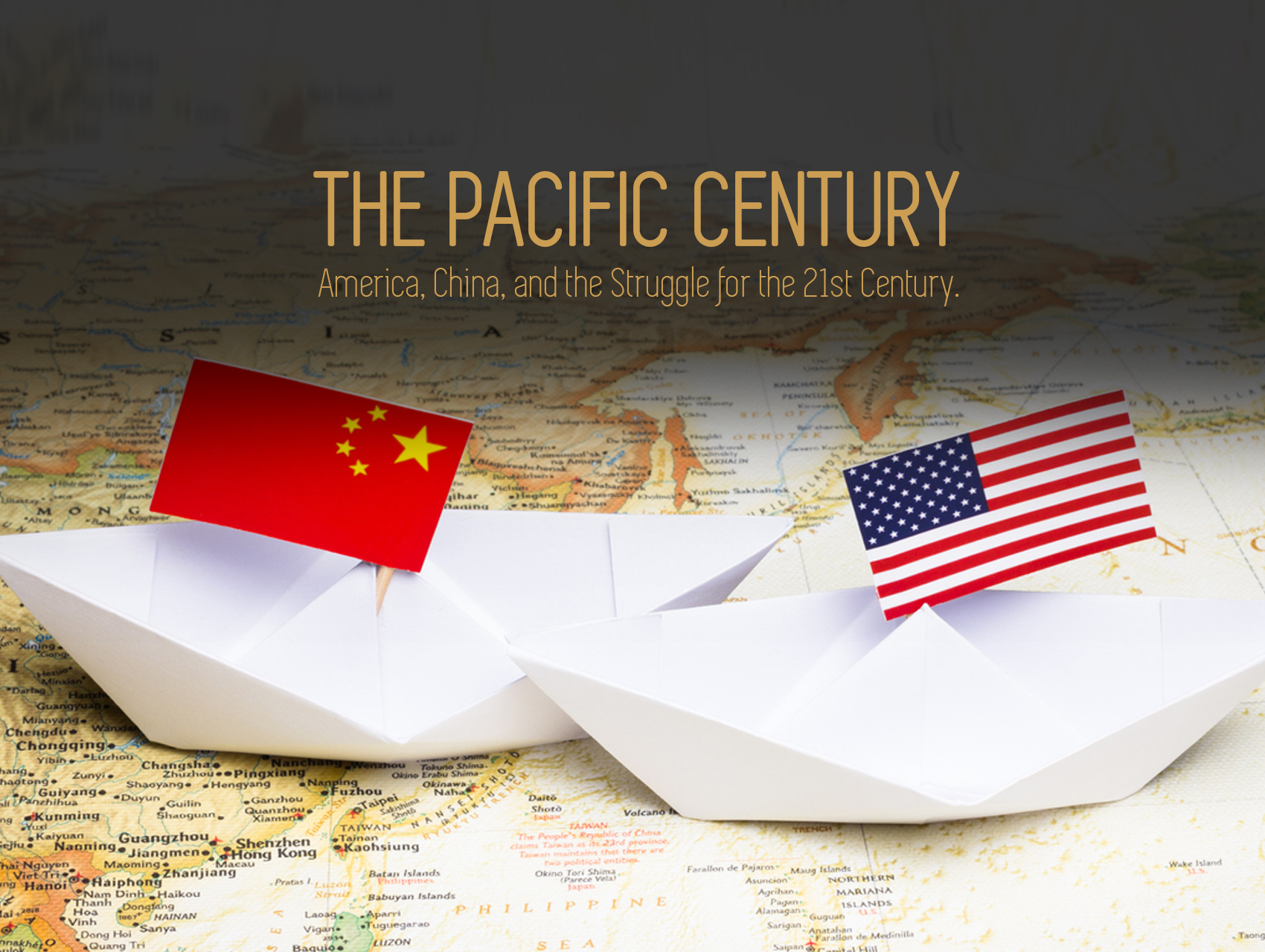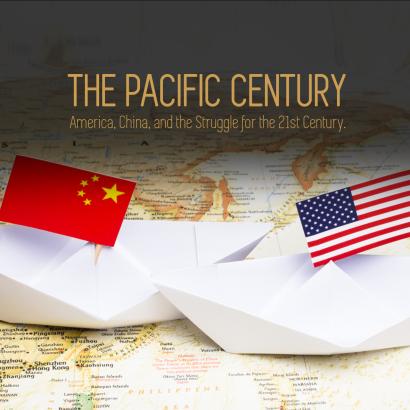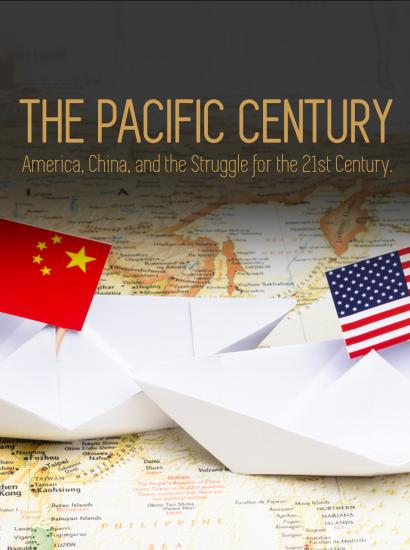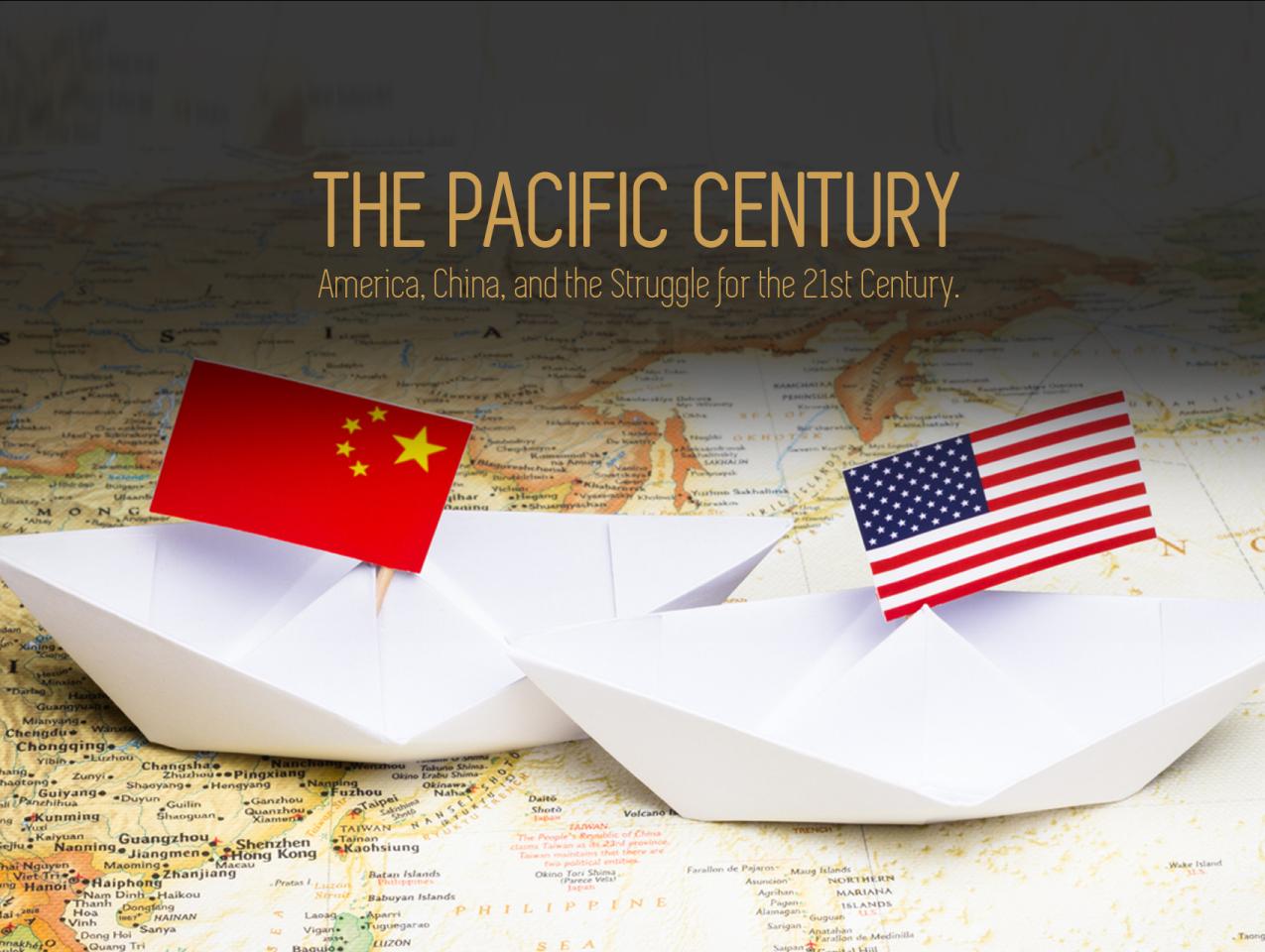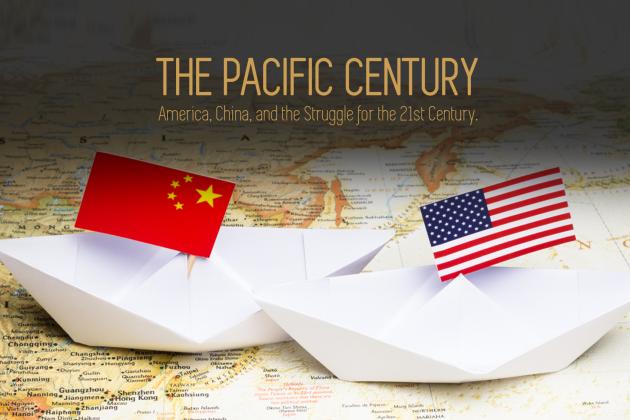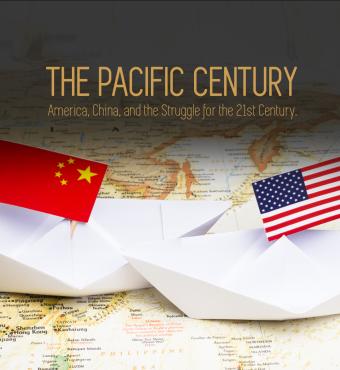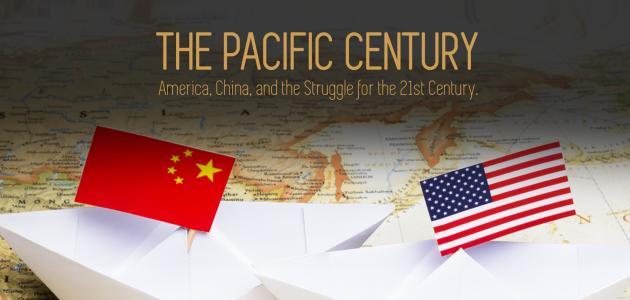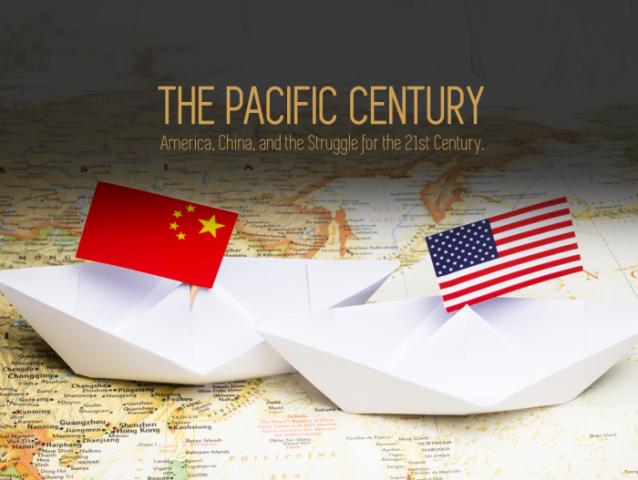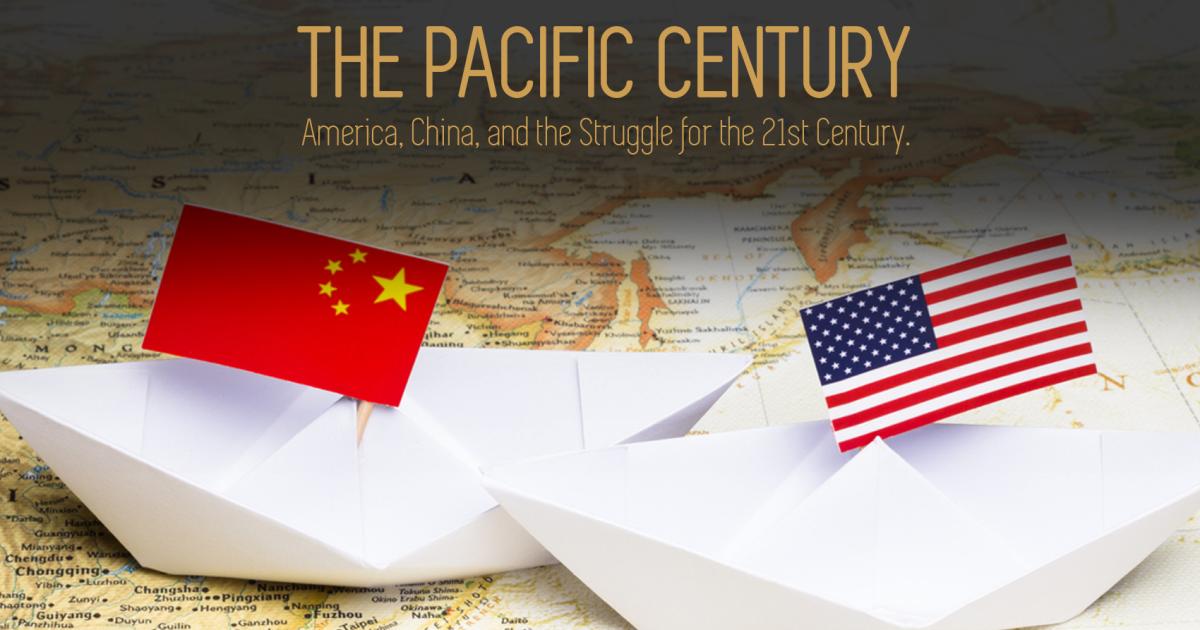US-China Commission Chair Carolyn Bartholomew and Vice-Chair Alex Wong discuss the annual US-China Commission report to Congress and its recommendations.
>> Michael Auslin: Welcome back to the Pacific Century, a Hoover Institution podcast on China, America and the fate of the 21st century. I'm your host, Michael Auslin. And today I'm very happy to be joined by two long time Asia experts and folks deeply involved in the policy world here in DC, which is Carolyn Bartholomew and Alex Wong.
Now, if you're wondering why it's both Carolyn and Alex. Those of you who are regular devotees of the work of the US China commission, or more formally, the US China Commission, US China Economic and Security Review Commission, you of course, will know that Carolyn is the chairperson of that and Alex is the vice chair.
And so, having the dynamic duo on to talk about the annual report from the commission, we'll just call it the commission, which most people in Washington eagerly await. To see what the commission has covered and what its recommendations are, we thought would be a great way to begin winding up 2023.
So let me do some brief introductions. Carolyn Bartholomew, as I mentioned, is the chair of the commission. She's been on the commission since 2003. She's been the chairman for five report cycles and vice chair for six report cycles. She is a longtime Washingtonian working on the Hill. She was chief of staff for then House Speaker Nancy Pelosi, served for a very long time with Speaker Pelosi, and was also a professional staff member on the House permanent select committee on intelligence.
She is an expert in US China relations, including issues related to trade, human rights, proliferation of weapons of mass destruction, and all other important issues. Alex Wong, as I mentioned, is the vice chair of the commission, recently joining the commission after having served as the deputy special representative from North Korea and the deputy assistant secretary from North Korea at the State Department.
He also served during the Trump administration as the deputy assistant secretary for regional and security affairs in the State Department's East Asia Bureau. Previously, he was a foreign policy advisor and general counsel to Senator Tom Cotton and also the foreign and legal policy director for the Romney-Ryan 2012 presidential campaign.
And those are just brief bios of both of these extremely experienced and distinguished members of the foreign policy world here in DC. So, Carolyn and Alex, welcome to the Pacific Century.
>> Carolyn Bartholomew: Thanks very much, Misha. Thank you for having us on.
>> Alex Wong: Yeah, great to be here.
>> Michael Auslin: Well, it's great to see you both.
Obviously, we've met in person and we've talked. I've actually testified before the commission. But what I thought we'd do today is have a discussion mostly on the 2023 report, but then expand it as we get into talking with each other on the sort of broad state of US China relations.
But before we did that, I thought, Carolyn, just in case anybody's not completely familiar with the commission, having 20 years of experience on it, maybe you'd explain just briefly what the commission is, why it's unique in Washington. And quite honestly, what it does every year.
>> Carolyn Bartholomew: Great, thanks again, Michael.
Thanks for having us on. It's always a pleasure to participate in discussions with Alex, too, my colleague and collaborator on the commission. So the commission was established in 2000 when Congress was considering China's accession to the World Trade Organization and had to pass permanent normal trade relations. And there were two commissions established by Congress at the time.
One, the other commission, the CECC, the congressional Executive Commission on China, whose mandate was to focus on China human rights issues, ours, the USCC mandate to focus on the national security implications of the US China economic relationship. And I think that the establishment of the commission really reflected lingering concern, which, of course, has only grown over the course of the past 2025 years about what was going on in the US China relationship, the impact of China's growth, its aggressiveness, all of those things.
So we do. There are 12 commissioners, 6 Democrats, 6 Republicans. We are proudly bipartisan. In one year, when we have a democratic chair, we have a republican vice chair, and the next year we switch around. So we have a Republican chair and a Democratic vice chair. Three. Each of us are appointed by the House and Senate, democratic and republican leadership.
Two year terms. Some of us get reappointed periodically every two years and have the opportunity to serve. I think we're unique in the sense that we really were developed by Congress to advise Congress on US-China issues, and it's become a very interactive process. We have tried over the years to really be forward leaning and identify issues that we think that Congress really needs to be thinking about and focusing on in the US China relationship.
And as the work has unfolded, we get a lot more input from people on the Hill, things they want us to be looking at, issues that are coming up. One example, of course, is fentanyl. I remember it was a number of years ago, we had a senator contact us and say, we'd really like to know more about what's going on with fentanyl.
So we have been forward leaning on a number of issues. Cyber, we were one of the first places in town talking about cyber. China in Africa is another example. So there are a number of things that we do. As I've said, we've really tried to identify issues that not everybody is paying attention to, but issues that need to be focused on.
We do a series of hearings, usually six or seven hearings during the year, and then we do this annual report to Congress, which comes out in November.
>> Michael Auslin: Right, and the annual report is a real report, it's several hundred pages long. It's not a brief report, like a 20 or 30 page thing that might come out of a think tank.
It's a serious, you know, it's a serious effort. I was just gonna ask, do you, I'm sure you'll say complimentary, but I just wanted to ask, do you see yourself in a, how are you different? For example, when you talked about your relationship with Congress from, let's say, congressional research service, where Congress also tests them and says, hey, we want to know more about this, and they continuously write an update reports.
Why and how are you different?
>> Carolyn Bartholomew: That's an excellent question, Michael. I think one of the main ways is we have a lot of freedom to identify. I'm not saying that CR's doesn't have freedom, but a lot of freedom and opportunity to identify, again, emerging issues that we really are focused on, and then to focus on those in depth through our hearing process.
One of the things I really like about our commission and our commission hearings and you've participated, is that there are opportunities for the members of the commission to really interact with our witnesses. We don't have a situation where people are just sitting there saying, you know, we have, of course, over the years had some people who do say, this is what I believe, tell me why I'm wrong.
But it's a really interactive process between us, the commissioners, and our witnesses, and the witnesses with each other. And so I find that there's a, a really good intellectual foment that takes place as we try to come to some consensus. And that's another thing that really characterizes us, is that we are a consensus body.
The report that you mentioned has 30 recommendations this year. We have a terrific staff who works on initial drafts for us. And then we sit in a room together, sometimes twelve of us, hashing it out page by page, paragraph by paragraph. Sometimes it's line by line and word by word.
So it becomes a really true bipartisan consensus product with a lot more input, I think, than from a lot of different viewpoints than CRS actually does.
>> Alex Wong: Yeah, I think that's where a lot of the influence and perhaps credibility of the commission comes from. It's the fact that appointees from across the political spectrum and across the policy world of Washington are coming together and putting forth, for the most part, consensus recommendations that have that credibility.
>> Michael Auslin: So, Alex, actually, it's a good segue to ask you about this year's report, but if I seem to remember, I may be wrong. Correct me, as I'm usually corrected on this podcast, because I'm often wrong. But I seem to remember, Carolyn mentioned the bipartisan nature, six Democrats, six Republicans.
And yet I seem to remember the commission being labeled as a hawkish commission and the reports as being hawkish reports because they often take a very sober, realistic, and somewhat forward-leaning view on China. That might not be what we would expect from a bipartisan commission, which often is lowest common denominator.
>> Alex Wong: Right, I mean, some might say hawkish, others might say Prussian. I think from the beginning, the focus of the commission, and I've only been on it fairly recently, but the focus of the commission has been to scrutinize our policy with China and China's strategy outwardly toward the world.
And how that's connected to its own domestic internal policies and strategies. So it's with that kind of skeptical eye, that bringing high scrutiny to it, that's been the mission from the beginning. And as Carolyn mentioned, I think the commission's been ahead of the curve in some ways. But interestingly, Washington, as you know, Misha, and the wider policy world in here and among our allies and partners has, I think, come around more towards the view of the commission, understanding that the relationship with China and the Communist Party is competitive and in some aspects adversarial.
And then we have to make corresponding policy changes.
>> Michael Auslin: So perfect segue then into talking about the report, Alex, if you might, start us off, and then we'll get into some more of the specifics of the different chapters. But what's the takeaway? What do we need to know as we're beginning to prepare for a presidential election next year?
So the season will be wrapped up in all sorts of different issues. But what's the takeaway, if you can boil it down for us?
>> Alex Wong: Right, I think stepping back, the approach of our report this year is to look at the deep structural aspects of China's strategy toward the United States and the world.
And what we should do in response. In the news, when people talk about China, there's a lot of focus on summits and meetings, freezes and thaws and high level contacts between the US and China and between our european allies in China. That's not the focus of the report.
And to draw from an analogy, watching that type of diplomatic back and forth is kinda like standing on the beachfront and trying to understand the character of the ocean by watching the tidal currents, the ebbs and flows of the waves right in front of you. That's not unimportant.
You need to understand the tidal currents to navigate, perhaps in the day to day. But to truly understand the ocean, you have to get at the deep ocean currents animating it. So we're trying to get at the deep currents animating the US China relationship. So if you look at the report this year, number one, we look at the economic kind of structural situation of China.
Their current debt challenges, their challenges moving to a consumption led economy. And what does that mean for China's strategy? What does it mean for our responses in the economic realm? We look at China's educational system and how the weakness in its ability to produce human capital might hamper or at least present challenges for its attempt to move its economy up the value chain and achieve its economic security strategy.
Then we move to overall influence operations. What is China's strategy globally to their influence in the media or in the political space in media? How are they using lawfare? What is their legal strategy to affect and push out their vision of not just international law, but domestic law, and the use of chinese domestic law extraterritorially to expand its influence and exert its designs?
And then last, we look at the technological and military realm, starting with what are China's military relationships, its mil-to-mil cooperative program programs? How are they using that to advance its interests? And how are they investing in technology in the military realm, not just to fast follow or be a peer competitor in the military space with the United States?
So how are they trying to leapfrog us? Everything from AI to undersea warfare capabilities to space-based nuclear weapons. These are all things we're looking at, because these will affect where China's strategy is going in the immediate term as well as the long term, and then what our responses should be.
>> Michael Auslin: So, Carolyn, that is a great overview, Alex, and I appreciate it. I would mention on the tides that as much as you have to understand the deep ocean currents, you also have to watch out for the riptides sometimes. Of course, that's what we always get focused on because that's the immediate crisis and the immediate danger.
But obviously, as someone who's just spent a lot of time in terms of Asia in general looking at what I hope are deeper structural issues. I've always admired that about the commission and appreciate that you stress that it's not always something that happens in Washington because you get caught up in a cycle.
That said, Carolyn, you have such a longitudinal perspective on this. I thought for a second maybe to turn to you and ask you on the economic side. When you joined the commission in 2003, those were the go go days for China. It was two years after it had gotten into the WTO.
It was igniting a decade of growth. It was actually hard to think back that far, but it was only barely ten years since Deng Xiaoping had reignited China's reforms with his famous southern tour. So you've seen the growth, you've been there through the growth of China during this extraordinary period.
Now that we're 20 years out and you've completed 20 cycles of this, what's your assessment, as the commission notes, the headwinds that China's economy faces, what does that really mean?
>> Carolyn Bartholomew: Misha, that's an excellent question. I just want to loop back into the question you were asking or mentioned that we were considered hawkish in the early years.
And it's been interesting to watch over 20 years the transition in the policy debate and how things have changed, because, as Alex said, what we, we have not changed our policy positions, but the whole debate has shifted in DC. And when this commission was started to tie into the economics, there were thousands of cheerleaders for the US China economic relationship.
The business community believed that they were going to make a fortune both producing in China and marketing to the chinese people. So we were one of the only places that was looking at some of the downsides of the relationship economically and national security. As Alex mentioned, sort of as we were looking at this year, there really are two dynamics that we were focusing on.
One is the serious economic challenges that the Chinese Communist Party is facing. There are structural problems their economy that they are either unwilling or incapable of addressing, including, of course, this massive debt that they have. Moody has just downgraded China's debt rating, I think, to negative, and that has certainly changed the environment as people are looking at, is it a good place to invest?
We have pension funds that are investing there. Is that wise investment? The people understand what their investments are, where their investments are going, fueling, for example, research that might be helping China's military that could eventually take us on, so there's that. And at the same time, that's coupled with increasing Chinese aggressiveness, both military aggressiveness in the South China Sea, but its promotion through the Belt and Road initiative, the propaganda that it's doing, its interest and its desire to sort of recreate the global system in its own image.
And that I think those are the bigger dynamics that we definitely have been focusing on over the years. Another thing that I think is interesting again with the perspective of 20 years on this commission, is in the early years, we had people, the military people, the security people who came on the commission were pretty traditional national security people.
What you would think of as military strength and the economics people were pretty traditional economics people. And what has happened over the years is those areas, those sectors have sort of meshed together. And I think, particularly when it comes to technology, they both have economic consequences, right? The future of our economy is based on our technological innovation and the national security implications of what China might be doing with that technology.
So it's been a very interesting thing to see. I remember one time, probably about ten years ago now, I was at a group discussion about this, and somebody, I won't name him Misha, but it's certainly somebody, you know, who was from the traditional military side, started talking about the economics, and I was just floored.
I mean, it was great, but it's that kind of merging those two issues together to come to some sort of understanding of what are the consequences, both militarily and economically for the US.
>> Michael Auslin: So before turning to the military and the tech side, Carolyn, let me ask you first, what specifically does the commission believe that the US should be doing to.
I think these terms of art always change. I think the current term is de-risk. It used to be decoupled and it used to be whatever the things were. What is it specifically that we need to do? Do we need to have our sneakers stop being made in China?
Or is it something a little bit more sophisticated? And if so, are we getting any closer to that? What is the commission recommending to Congress?
>> Carolyn Bartholomew: So I'm gonna say right up front that because we are a consensus institute. Consensus organization, there are some issues that, much to the chagrin of some people, we actually just really don't take on like international, the international trade agreements.
We have a little bit of conversation about that. We don't have any recommendations about that. But we have been concerned both at the micro level in terms of the economics issues with the investments. Again, for example, and the PCAOB was making sure that Americans who are investing in China have access to independent auditing information so that they can understand the risks that are being faced.
So that's one of the-
>> Michael Auslin: And the PCAOB for those not familiar.
>> Carolyn Bartholomew: The PC, what does it stand for? I'm gonna have to look that one up, I'm so used to throwing. So PBOC, of course, is the People's Bank of China, it's an accounting oversight board.
>> Michael Auslin: Okay, it's the Chinese accounting board.
>> Carolyn Bartholomew: No, no, no, no, it's ours, it's ours. It's ours.
>> Alex Wong: I think it's Public Committee for Accountability and Oversight Board, if I"m the PCAOB.
>> Michael Auslin: Okay.
>> Carolyn Bartholomew: So again, that's one of the issues because certainly as the Chinese government has clamped down on information, both statistical information, right, we've seen that as an issue.
They have over a 21% youth unemployment rate and what do they do? Instead of figuring out how to address that successfully, they just stop reporting those numbers. So there's that kind of information, but there's also the risk analysis that should be taking place when Americans are investing. So that's one of the issues that we've done.
We did recommend this year that the congressional Joint Economic Committee used to do, used to produce an annual unclassified report on the state of the chinese economy and economic policy decisions. One of the things we've recommended to Congress is that they re institute that report, which they haven't done for a while.
We recommend that Congress consider legislation requiring federal financial authorities here, including the Federal Reserve, to seek specific information from bank and investment institutions regarding their exposure to and involvement in the PRC. We have steps that we say to combat tariff evasion. There's an obviously ongoing discussion about supply chain resilience.
Some people support friendshoring, some people support just onshoring. But we need to make sure that as companies are leaving China to manufacture elsewhere, particularly in Southeast Asia, it is often Chinese companies that are establishing themselves in Southeast Asia and they are doing that in a way to evade any tariffs that we have put on products.
So that's an issue that we think that Congress needs to be looking at. And again this year, a lot of it was about corporate disclosure requirements, making sure that people in this country have access to the kind of information that they need to do, need to have in order to make sound investment decisions.
Those are some of the micro things that we've talked about, yeah.
>> Michael Auslin: And one more quick one, since it's the topic du jour, it's on everybody's lips, which is semiconductors.
>> Carolyn Bartholomew: Yes, we actually recommend that the Congress ask the GAO, the General Accountability Office, to do a report within 180 days of the effectiveness of the recently imposed semiconductor export controls.
Are they working effectively? What's working, what isn't working along those lines? And I certainly will defer to Alex when we talk about the tech issues. I also just want to note that we are recommending here, it's one of my favorite recommendations. It didn't make it up into the top ten, but that we recommend that Congress consider evaluating the potential for establishing a single export licensing system.
Export licenses, right now it's complicated process, fifferent agencies are involved. It really needs to be redone. First established export controls in the 1940s, updated in the 1970s, updated again relatively recently. But there needs to be a comprehensive look at this and to see whether we can have a more efficient system for business and that we can have staffing in these agencies that can address the challenges.
I always say government moves slowly, technology moves quickly. By the time the government has made decisions, issues have moved on, on technology, and we are losing them. We're losing the ability to control some of the things that, again, might have national security implications for us.
>> Michael Auslin: That is, again, export restrictions.
Just the, the question, of course, there's dual use technology. There's all of these issues, probably some of the most arcane issues. For those who are not specialists and trying to understand it from the outside or weigh in. Alex, let me shift, instead of continuing on the econ though, let me shift To the question of chinese influence operations, which is an entire chapter essentially in the report, China's efforts to subvert norms and exploit open societies.
What does that mean? I mean, we are an open society. Do we want to become a closed society? What are we doing in vis, what do we need to do vis a vis China? What's the threat?
>> Alex Wong: Yeah. Well, let me be clear. We're not recommending at all that we match China by closing our society.
That's not the openness of our society as a source of our strength, but it does present certain openings and weaknesses that China's attempting to exploit. Now, I'll cover a number of them. I mean, first of all, we talk about the educational system here, the higher educational system in the United States, and the amount of funding and donations coming from chinese entities to the US higher education system.
Now, not all of those are legitimate, not all of those are for influence purposes. But what we do recommend is servicing more information about, a, the scale of those donations, b, to what research areas they are going to, and c, ensuring that that information is coming out in a timely manner so that it's available publicly.
But as well as to our intelligence and law enforcement agencies to determine if there is an attempt here to influence higher education and also extract the type of research, particularly in the technological realm, that China is attempting to build and leapfrog the United States. So there's a connection there between both influence as well as its technological strategy.
But I wanna talk a little about the lawfare aspect of this. As many of your listeners know, the term lawfare is a term of art, but essentially trying to use and leverage the US and the free world's commitment to the rule of law, but to political ends or security ends.
So one item I wanna highlight is the use by Chinese front groups, the United Front Department and others to silence critics in the United States by subjecting them to defamation lawsuits. Now, there's no merit to these suits, but they're strategic in that it imposes costs on the dissident, if you wanna call them that, or the person with a company making or saying things about the Chinese and the CCP, legal fees, discovery fees.
So we make a recommendation to counteract that, that at the federal level, we should have what are termed anti-slap lawsuits or anti-strategic lawsuits against public participation. Which shifts fees to the lawsuit bringer and moves up in the process an evaluation of whether the suit is meritorious or not, but that this is an attempt to insulate our open society and our rule of law from abuse by the Chinese.
>> Michael Auslin: In addition to, I should mention there is a segue here, in addition to the annual report, we should mention that the commission puts out various different reports. And I've always found one of the most interesting report and one that you just updated on to continue this theme of open societies, China using international organizations by placing their own personnel in them and then often shifting the focus or the goals of some of those organizations.
I mean, probably one of the best known ones, thanks to Covid, would be the WHO, the World Health Organization. But it's happened in the International Civil Aviation Organization, of course, in the International Telecommunications Union, attempted in the World, was it Intellectual Property Organization, WIPO. But Alex, can you talk a little bit about that?
Now, those, of course, are not american institutions. Your recommendations to Congress cannot change how who does its business. But can you talk a little bit along the lines of, of the United Front Work Organization, the others, about this use of international organizations, which we all think is just a great thing?
We have more international organizations, there's gonna be more cooperation.
>> Alex Wong: Yeah, look, the Chinese were ahead of the curve of, really, the rest of the world in seeing these international organizations as arenas for competition. And the terms of the competition are, can you get, as you were mentioning, can you get your nationals in leadership positions to push your nation's interests.
Or in the Chinese, whether it's isolating Taiwan from these international organizations, or trying to pull the standards technologically, trade wise, that go through these international organizations, pulling it towards more of a chinese character. And the United States and our partners relate to the game. We didn't treat these as arenas for kind of politicking.
International organizations are in large part less like diplomacy and more like unruly legislatures. You need to log roll, you need to pressure, you need to win votes to win these positions. And I think the United States now has woken up to this. And when I was in the Trump administration, we empowered an ambassadorial level special advisor to head up international organization elections to compete with China.
To marshal our partners in the free world, to identify the meritorious candidates, push them, and look, make deals in law rule to try to get the right people in the right positions to blunt this strategy by China. So we're a little late to the game, but I think people have woken up to it.
>> Michael Auslin: And one of those successes was the World Intellectual Property Organization, where China.
>> Alex Wong: That's right.
>> Michael Auslin: I mean, it's ironic, let's put it that way, that China, perhaps one of the larger abusers of intellectual property, wanted to have their their person, a national, head up that organization.
I recently had it explained to me, or argued to me by a State Department official that you could look at this and say, well, so what? So you've got a Chinese person, Chinese national, heading up X organization, World Intellectual Property Organization. Why does it matter? You've got French and you've got Italians and you've got Angolans and Indians and Japanese.
Why does it matter? And the argument that was made to me was that if you look at how, and I'm interested in both of your reactions, if you look at how Americans, let's say, act when they are put as officials and responsible directors of these organizations, they act in the interests of the organizations, and often they even act contrary to Washington's interests.
They fully are agents of those institutions and organizations. On the other hand, when Chinese are heads of those organizations, they act as agents of Beijing. They don't act as agents of the organizations, but they're pushing Beijing's strategies and goals. Is that an accurate or fair assessment?
>> Carolyn Bartholomew: Yes, I think that that is actually an accurate assessment, and it is.
As China's role in the world has grown, we are seeing that many of their actions, most of their actions are about promoting themselves. And everything that the CCP does, of course, is designed to try to keep the CCP in power. I wanna loop back on the international organizations briefly to just say that it is not just, I think people have a tendency to think about things like the WHO and the UN, but it's also the international standard setting bodies that the Chinese have been very active.
Actively engaged in. And that has consequences for us economically and consequences for us both in national security. Because when they are essentially in charge of standard-setting bodies, they are making sure that the standards that are being set are for Chinese-developed products.
>> Michael Auslin: Could you give an example, maybe, just a quick example just for the layman?
>> Carolyn Bartholomew: Let me give an example of that. It would be even something like a telecommunications, right, I mean, a standard for 5G or something like that. When the Chinese are involved or controlling the standard setting bodies on these things, they are making sure that the technical standards advantage their products and their companies, which in exchange, in turn, actually disadvantage ours.
And there's so much that flows from this technology about apps. There's sort of an economic framework where you can have one technology, but so many things build on that technology that if we are shut out of one of these technologies, then we are losing all of the downstream advantages of things that would support that technology.
So that was one thing I wanted to mention. The other thing, I think, when we look at international organizations is that you have to put it in the context of China's propaganda work around the world, right? It is not just us that they are trying to influence. It is the stuff that they are doing through the Belt and Road Initiative, the stuff that they are doing investing in access for natural resources.
Many of those things are being done in countries where they are using their investments to get the responses that they want, the votes that they want in an organization like the United Nations. Another implication of that, of course, is that they are shutting Taiwan out everywhere they possibly can.
And that even goes down to not allowing people from Taiwan to work in something like who it is about both participating in it as an institution, but it is also about who they are allowing to staff these things. And that has serious implications both for the effectiveness, I think, of the organizations themselves and also, of course, for Taiwan space in the world.
>> Michael Auslin: Absolutely, I hope we can turn to Taiwan, but I know we're doing sort of a romp through the world of China and the world of America-China relations. But given time, I wanted to turn, Carolyn, and actually ask you, because you have such extensive experience, and this was clearly something that was very important to Speaker Pelosi, which is a question of human rights.
And where we stand today, the world has watched, and some would argue, watched silently what's happened in Xinjiang. It has watched, I would argue, largely silently what's happened in Hong Kong to bring in Taiwan. That is sort of the ultimate or one of the ultimate goals of the party is to do to Taiwan what it's done to those other potentially rogue/breakaway areas.
How does the commission handle it? And as you mentioned, there is the congressional executive commission, which deals with human rights. But how does your commission handle the question of human rights? What have you looked at? What do you recommend? What do you worry about?
>> Carolyn Bartholomew: Yeah, that's also an excellent question.
I think there are two places that I can, well, three areas that I can think of, but not necessarily geographic. One, of course, is the Uyghurs and things like the Uyghur Forced Labor protection Act. We have talked about the de minimis exclusion, which is that anything under $800 doesn't need to go through our whole customs process.
So companies like Shein and Temu are just flooding the United States with products. It's having serious economic implications for what remains of our textile and garment industry in this country. So that's one thing. So it's trade related, but it is also human rights related. Hong Kong, we spent time looking at Hong Kong, what's happening in Hong Kong.
The Hong Kong legal system is being destroyed, frankly, by the Chinese government. And that has implications also for the business community, the international business community, the us business community. They're naive if they think what's happening with Hong Kong's legal system will not eventually catch up with them. So those are two specific areas where we do that.
I think a third area that we look at is we look at surveillance technology, right, which has fundamental human rights issues. So it's data gathering, it's, again, the surveillance technology that the Chinese government, Chinese companies are selling to other countries. Things like smart cities, even here. We need to make sure that when our communities are investing in smart cities, that they are thinking about the consequences of what having Chinese participation in smart cities infrastructure would do and would do it.
So it's really three areas, as I said, Uyghur Forced Labor protection, Hong Kong judiciary, in particular, and then this issue of surveillance and surveillance technology.
>> Michael Auslin: That's great. Obviously, there's a lot more to talk about, especially that last one in the surveillance technology. And it gets to all the questions about tech competition and the like.
But again, just in the interest of time, cuz we could just do entire hours on each one of these. But, Alex, I'd like to turn, if I could, to the military question, which is, in many cases, and whether warranted or not, it's something that gets an enormous amount of attention in DC cuz there's an enormous amount of money involved.
What is the state of the military balance, what does the commission find, should we be worried, really? I mean, look, we got 11 aircraft carriers, they've got, what, 2, maybe 3. What is really the story of the challenge that we have on the military side? And is it getting worse, is it getting better?
>> Alex Wong: Yeah, I do think we have a serious challenge on our hands with China militarily. And I think that's not a secret and that's a consensus opinion across our military and our policymakers. Let me focus on two areas. What we're seeing is China's making heavy investments, not just in terms of money, but in reforming and modifying its bureaucracy and its procurement to pursue advantage and leapfrog the United States in two main areas that concern me.
Number one is in the nuclear realm. Now, we've over the years tracked China's nuclear development, and not just in terms of the number of warheads, but in the modernization and the diversification of its nuclear capabilities, both in delivery systems and in the yield. So what we're seeing and what we talk about in the report this year is the possible development of the capability of China to produce low-yield nuclear weapons.
Which may indicate a change in its nuclear doctrine and how it would fight a war, whether in the spectrum between conventional and nuclear, but also looking at delivery systems. I wanna highlight one item, which is China's already a leader in hypersonics and space-based capabilities, and to the extent that they add and are pursuing a space-based, what's called a fractional orbital bombardment system, which would basically obviate our missile defenses.
That introduces a new realm of instability at the nuclear level. It will force us to rethink our own doctrine of deterrence, and it's forcing us, and we should pursue our own technological innovations to counteract that and to deter that. That's a new set of thinking, and it's not a secret, but we talk about it in our report.
Furthermore, the US has long had an In undersea warfare capabilities, which is particularly important in the Indo-Pacific and for deterrence instability in the Indo-Pacific. China is trying to lead progress there. They're trying to neutralize our advantage by pursuing and improving their own undersea capabilities as far as quieting their systems, but having to detect our submarines, our undersea platforms.
And one worry there is that they're able to improve and speed up that innovation because of its relationship with Russia. Russia has very advanced undersea capabilities. And right now, Russia is very dependent on China, at least for economic support in its war on invasion of Ukraine. Now, we don't have evidence that Russia is proliferating undersea technology or giving it to the Chinese, but it's definitely something that the Chinese would want from Russia, and they have some leverage now.
So key worries for us and key threats that might affect negatively the military balance in the Indo Pacific.
>> Michael Auslin: So that's also just a great overview and something we could, of course, continue to talk about for a long time. But as we begin to wrap up, I'd like to ask sort of a cultural question, if I can.
I know we're not really getting, unfortunately, to Taiwan right now. I think it's an area that probably needs its own discussion, but ask you a bit of a cultural question to both of you. But Carolyn, again, you've been in Washington a long time. You've done this for a long time, been on the commission for 20 years.
I guess the first question is, are you confident that we really are where we're, that we're getting to where we need to be? I mean, should we take hope, take heart? Or are the pathways that we've seen develop over the past 20 years, let's say so ingrained now, so developed, so advanced that we can talk all we want and try to tweak here and there, but we're really, we're really not going to be able to respond how we need to, or are we getting to where we are?
It's a broader than just an area-specific or issue-specific. It's more about the culture of how the United States is approaching the relationship with China. Let me start with you, Carolyn, then ask Alex.
>> Carolyn Bartholomew: It's a really interesting question, and I guess I would answer when you raise the issue of hope, it would sort of be hope for what we want, right?
I mean, hope, what is it that we're looking for? So in the bigger relationship, again, I've been actually doing this since June 4, 1989, since the Tiananmen Square massacre. We have certainly seen, as Alex started, ebbs and flows in what is going on. I don't think that we are doing everything that we could be doing both to ensure of our own economic vitality going forward, our own economic competitiveness, and making sure that we are focused where we need to be on the military, technology acquisition, all of these things.
I think we could and must do more on ensuring that chinese acquisitions of us companies are not improving their military capability. I think we have to face the reality that we may be in a conflict with them, a hard conflict with them. My hope would be that we all figure out a way not to have that happen.
I've always been concerned about the fact that somehow the onus of trying to improve the relationship is always put on the United States. Somehow the Chinese, they always blame us for when things are bad. And a lot of people pick up that narrative and somehow think that the improvement has to come from us.
The improvement has to come from both sides, right? There are things that the Chinese government needs to do, there are things that the US government needs to do. So, I mean, I'm always hopeful in the sense that you just don't know where things are going to go and what's going to happen.
We've seen that certainly this year, but hopeful in the sense that I think that there are certainly a number of people who are looking at these ideas. There's one strain that I always pay attention to and I'm concerned about, and that is the economic interests, right? That when there are people in this country, investment banks, for example, fund managers, who see their big returns coming from China.
They have, I think, too much of an influence in terms of what's going on with the policy discussion. But we have seen successes, and I think that, again, the fact that this is generally a bipartisan response, both the commission and China policy generally, I'm hopeful that we will be able to figure out ways to work through all of this.
>> Michael Auslin: Alex, should we take heart? Are we on the right track? Or is it a foregone conclusion that we will slip into permanent second place?
>> Alex Wong: Well, look, I'm an optimist, number one, but also a strong believer in the free world and the United States and our friends and allies.
What I will say is, I think in recent years, past three to five years, which is a pretty short time in world history, there has been a strong change in the posture, not just in the United States, but among our partners and allies across the world, in instituting more balance in the relationship with China, economically, militarily, politically.
Now, let me start with our friends and partners in the Indo-Pacific. Now, I will argue that they're not new to this China competition idea. I mean, for hundreds if not thousands of years, their strategic cultures have been how do we balance, whether individually or together, a powerful china, a large china.
But we're seeing, I think, the start of major muscle movements, particularly in the security realm from our partners like Japan, our continued or renewed cooperation in military posture in the Philippines. But other partners, we're looking at the quad, for instance, as at least a discussion group for how to bring balance in the Indo Pacific region.
Let's move to the Europeans. During my time in the administration just a few short years ago, the conversations with Europeans were very different. We were there, the commission was there this past spring. And these new terms, whether it's de risking or the term that I like that was coined by the Europeans of China as a systemic rival, that's a public realization that China's strategy and the character of the EU and european nations are systemically incompatible and that there need to be policy changes.
Now, I think we're still waiting for those big policy changes on the european side, but the fact that they talk about it in this way, that the concept is there, that this is a competition, I think is a big move for our european partners. But then here in the United States, we've all been in policy circles.
I think even five years ago, there was a live debate between kind of traditional engagement with China versus a competitive posture towards China. I think today that debate is over. I think its consensus now of not whether were in a competition, but how do we execute that competition to advance our interest and our ideals together with our partners and allies.
And that's a sea change in DC. So I think were on the right track. And I do think we have inherent strengths as the United States together with the rest of the free world in this competition with a communist China.
>> Michael Auslin: Well, it's always good, especially in this season, to end on an optimistic note.
We don't always do on this podcast, but this is one of those times, clearly with both of you expressing some guarded, cautious optimism, which I appreciate. I mean, we could have gone on for a lot longer talking about all of these issues. This really was a really quick survey.
And so I encourage everyone to go to uscc.gov, that's the commission's site, to get the annual report, but get the other reports. You can also read the testimony of the hearings. It is really, I would argue, one of the most important organizations, groups in Washington looking at probably the most critical issue we face.
So, always great to talk with you, Carolyn Bartholomew, Alex Wong, the chair and vice chair of the US China's Economic and Security Review Commission. Thank you so much for joining us on the Pacific century.
>> Carolyn Bartholomew: Great, thanks so much, Misha, for having us on.
>> Alex Wong: Thank you, great to be with you.
>> Michael Auslin: So for the Pacific Century, I'm Michael Austin, thank you for tuning in, and we will see you next time.
>> Speaker 4: This podcast is a production of the Hoover Institution, where we generate and promote ideas advancing freedom. For more information about our work, to hear more of our podcasts, or view our video content, please visit hoover.org.







